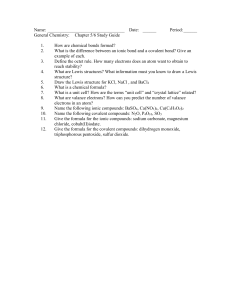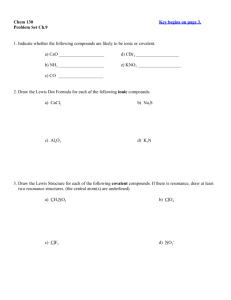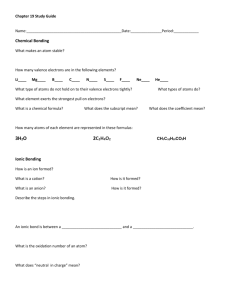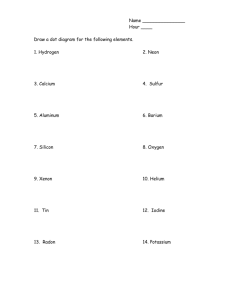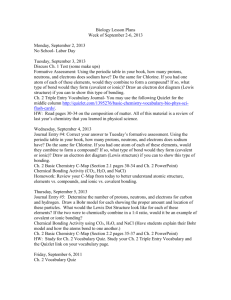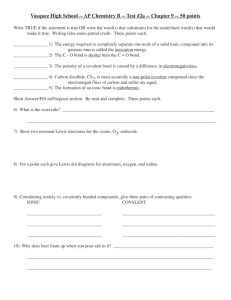Review 2 Answers
advertisement
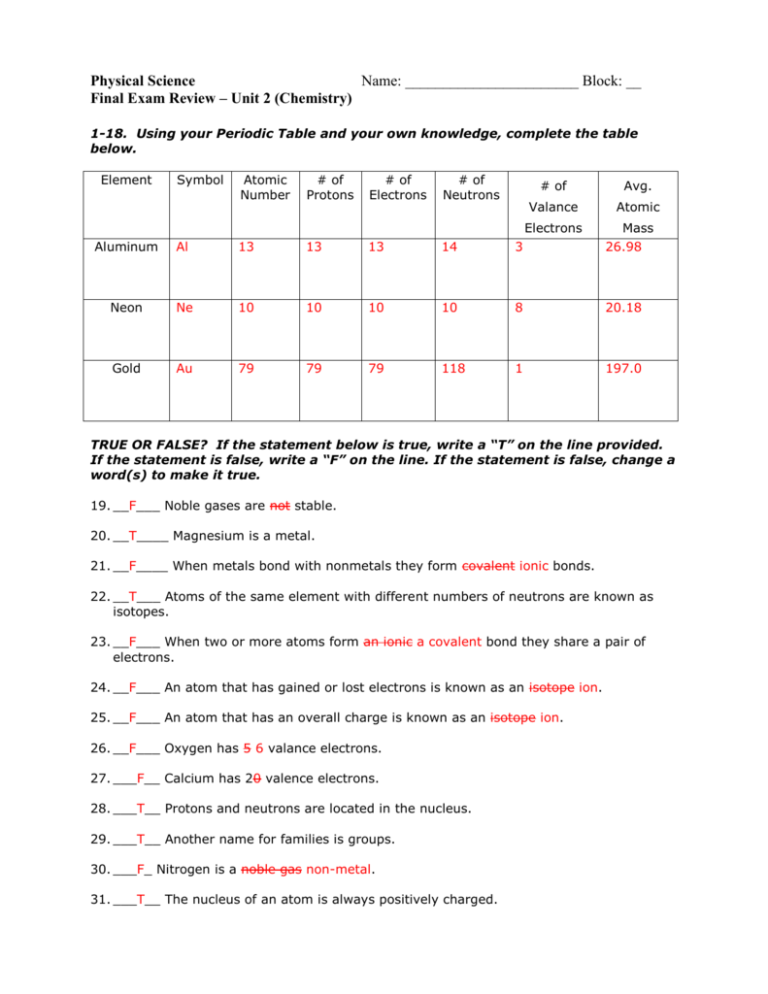
Physical Science Name: _______________________ Block: __ Final Exam Review – Unit 2 (Chemistry) 1-18. Using your Periodic Table and your own knowledge, complete the table below. Element Symbol Atomic Number # of Protons # of Electrons # of Neutrons # of Avg. Valance Atomic Electrons Aluminum Al 13 13 13 14 3 Mass 26.98 Neon Ne 10 10 10 10 8 20.18 Gold Au 79 79 79 118 1 197.0 TRUE OR FALSE? If the statement below is true, write a “T” on the line provided. If the statement is false, write a “F” on the line. If the statement is false, change a word(s) to make it true. 19. __F___ Noble gases are not stable. 20. __T____ Magnesium is a metal. 21. __F____ When metals bond with nonmetals they form covalent ionic bonds. 22. __T___ Atoms of the same element with different numbers of neutrons are known as isotopes. 23. __F___ When two or more atoms form an ionic a covalent bond they share a pair of electrons. 24. __F___ An atom that has gained or lost electrons is known as an isotope ion. 25. __F___ An atom that has an overall charge is known as an isotope ion. 26. __F___ Oxygen has 5 6 valance electrons. 27. ___F__ Calcium has 20 valence electrons. 28. ___T__ Protons and neutrons are located in the nucleus. 29. ___T__ Another name for families is groups. 30. ___F_ Nitrogen is a noble gas non-metal. 31. ___T__ The nucleus of an atom is always positively charged. 32. ___F__ Alkali metals are located in Family 18. 33. ___T__ Oxygen is a diatomic element. 34. ___T__ Oxygen and nitrogen will form a covalent bond. MULTIPLE CHOICE. Choose the best response and place the corresponding letter on the line provided. 35. ___C__Transition elements make up groups a) 5 through 9. b) 10 through 14. c) 3 through 12. d) 4 through 20. e) none of the above 36. ___E__Which of the following is not in the halogen family? a) Bromine b) Iodine c) Astatine d) none of these are in the halogen family e) all of these are in the halogen family 37-42. For each element, show the Bohr diagram and Lewis dot diagram. Element Bohr Diagram Lewis Dot Diagram Sodium * 11P 12N 2 8 1 Na 12P 12N 2 8 2 Mg * * Magnesium Fluorine ** 9P 10 2 7 * * F * * * 43. Sketch the bonding of oxygen and fluorine in the box below using Lewis dot structure. * * or * * ** * * ** F * O * F * * * * ** * * ** ** F * * O ** * * ** F * * ** a. Is this bonding ionic or covalent? _______covalent___ b. Give the chemical formula of the compound you draw above: __OF2______ 44. Sketch the bonding of lithium and sulfur in the box below using a Lewis structure. Li+ x S2x Li+ a. Is this bonding ionic or covalent? ______ionic_____ b. Give the chemical formula of the compound you draw above: ____Li2S____ Write the chemical formula for the following ions. 45. Ammonium (NH4+) and sulfur. S(NH4+)2 46. Calcium and sulfate (SO3-2). Ca(SO3) Name the following: 47. Li2O Lithium Oxide (ionic) 48. Cr3N2 Chromium (II) Nitride (ionic, transition metal) 49. BrF Bromine Monofluoride (covalent) 50. CaF2 Calcium Fluoride (ionic) Give the chemical formula for the following: 51. sodium chloride NaCl 52. zirconium (IV) oxide ZrO2 (transition metal!) 53. rubidium chloride RbCl 54. carbon tetrachloride CCl4 a. Balance each chemical equation below in the most reduced form possible. If the equation is balanced leave it as is and write “balanced” to the left of it. b. Label each reaction as synthesis, decomposition, single displacement, double displacement, or combustion. a. ___2__ KClO3 ____2__ KCl + ___3___ O2 b. __decomp____ a. ___4___ Fe + ___3___ O2 ____2__Fe2O3 b. ___comp_____ a. _______ Zn + ___2___ HCl _______ ZnCl2 + _______ H2 b. _Single repl a. _______CH4 + ___2___O2 ---> _______CO2 + ____2__H2O b. __Combust___ a. _______ FeS + ___2___ HCl _______ FeCl2 + _______ H2S b. ___Double repl
